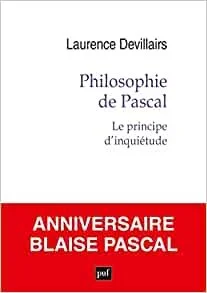pascal’s philosophy: the principle of inquietude
Laurence Devillairs
(PUF, 372 pages, 2022)
Pascal brings philosophy back into the midst of men, in the disorder of their occupations, the concreteness of their existence, to decipher the reasons that make them act, the powers that abuse them, the unreason that guides them.
—Laurence Devillairs
Often associated with the philosophers Malebranche, Leibniz, and Locke, the concept of inquietude seems to have been neglected by Pascal. Yet, as philosopher Laurence Devillairs argues in this book inspired by her deep knowledge of and passion for the philosopher, inquietude intervenes at strategic points in Thoughts, inseparable from man’s ability to access the truth (and therefore happiness).
Inquietude reveals what a careless life of “entertainment” seeks to conceal: in Pascal’ words, “If there were no obscurity man would not feel his corruption: if there were no light man could not hope for a remedy.” Inquietude is precisely that disposition that stirs us toward the truth and leads us to reflect on our “true state” in order to find happiness. It is not an end in itself; rather, it is that from which a thought, a philosophy, is elaborated: a principle, then.
In this erudite work that promises to be a future reference source on Pascal, Devillairs takes a step away from the classical Christian reading of Pascal’s Thoughts. In her eyes, reducing his work to a simple apology for Christianity fails to account for the conceptual originality of his work. Pascal’s principle of inquietude aims at describing a state—a condition—a desire for truth and happiness that cannot be satisfied yet reveals an “instinct that elevates us.” If inquietude leads to no certainty, at least it serves to “regulate one’s life.” What more can we ask?
Laurence Devillairs is a specialist in Descartes and philosophy of the seventeenth century. A graduate of the École Normale Supérieure, she is Dean of the Faculty of Philosophy of the Institute Catholic of Paris and author of The Philosophy Cure: Lessons on Living from the Great Philosophers (St. Martin’s Essentials, 2020). Her recent publications include Être quelqu’un de bien (PUF, 2019) and Petite philosophie de la mer (La Martinière, 2022.).

